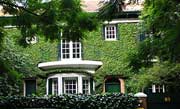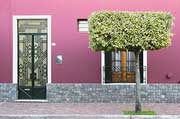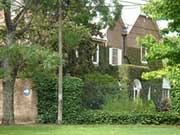Residential transaction costs are high in Argentina
How high are realtors´ and lawyers´ fees in Argentina? What about other property purchase costs?
Transaction Costs |
||
| Who Pays? | ||
| Real Estate Agent´s fee | 3% - 4% (+ 21% VAT) | buyer |
| Stamp Duty | 1.80% 1.80% |
buyer seller |
| Notary Fee | 1% - 1.50% | buyer |
| Registration Fee | 0.20% | buyer |
| Transfer Tax | 1.50% | seller |
| Costs paid by buyer | 6.63% - 8.34% | |
| Costs paid by seller | 3.30% | |
| ROUNDTRIP TRANSACTION COSTS | 9.93% - 11.64% | |
| See Footnotes Source: Global Property Guide |
||
How difficult is the property purchase process in Argentina?
Foreigners can purchase property without restrictions. A CDI (tax ID) number must be obtained from the Government before buying. Also, an Argentinean representative must be appointed by nonresidents to pay the property tax for them.
 Maria Reynolds of Reynolds Propiedades & Relocation stated that "middle and high end real estate in Argentina (both for locals or foreigners) is always sold in US$ cash". This is because of the unstable Argentine Peso. Middle and high-end properties, she said, "cover most of the northern suburbs, and most of the areas within the downtown that foreigners invest in, farms, and any tourism related areas in the interior of the country".
Maria Reynolds of Reynolds Propiedades & Relocation stated that "middle and high end real estate in Argentina (both for locals or foreigners) is always sold in US$ cash". This is because of the unstable Argentine Peso. Middle and high-end properties, she said, "cover most of the northern suburbs, and most of the areas within the downtown that foreigners invest in, farms, and any tourism related areas in the interior of the country".
Bringing in US dollars is not free. Withdrawal of money from the bank is taxed. Moreover, one can only withdraw in Argentine Pesos. A buyer will have to buy US dollars with the Argentine Peso just to convert the currency back to what is accepted in real estate transactions. It is possible to lose around 0.8%-1% of the money value when going through the official system, according to Mrs. Reynolds. If one will opt to go through a private broker, she says it is usual to pay around 2%.
Once the purchase price of the property has been agreed on, the buyer is expected to give a "boleto" or a down payment, usually around 30% of the purchase price. This is held in trust by the real estate agent. The "boleto" acts as a security. If the buyer pulls out of the transaction, the down payment cannot be refunded. If the seller backs out, the seller will have to pay the buyer double the amount of the "boleto".
 The "escritura" is the date of the closing of the transaction. All payments are settled and the official transfer deed is signed.
The "escritura" is the date of the closing of the transaction. All payments are settled and the official transfer deed is signed.
Taxes involved in the purchase of property are imposed by local authorities such as the provincial and municipal governments. Each of the 23 provinces and the Government of Buenos Aires City have the right to promulgate their own tax laws directed at certain economic activities within its jurisdiction. This explains the varied ranges of the tax rates in the purchase of a property.
The purchase process lasts one between and two months. The only documentation required by a foreigner is a Tax ID which is obtained from a Notary Public (Escribano) who, in turn, will require a power of attorney to do so.
 In recent years many foreign investors have acquired considerable areas of farming and live-stock raising land, as well as buildings in urban areas in Buenos Aires. Most real estate is held as freehold property; long-term leaseholds are uncommon.
In recent years many foreign investors have acquired considerable areas of farming and live-stock raising land, as well as buildings in urban areas in Buenos Aires. Most real estate is held as freehold property; long-term leaseholds are uncommon.
The whole process of registering a property takes about 55 days to complete.
Footnotes to Transaction Costs Table
The round trip transaction costs include all costs of buying and then re-selling a property - lawyers´ fees, notaries´ fees, registration fees, taxes, agents´ fees, etc.

 Currency:
Currency:
Exchange rate as of 24 Sept 2007: 1 US Dollar = 3.14588 Argentine Peso. Property value is US$250,000 approximately ARS786,500 (786,470 Argentine Peso)
Location:
Buenos Aires City

 Real Estate Agent´s fee:
Real Estate Agent´s fee:
Real estate agent´s fee is around 3% to 4%, plus 21% Value Added Tax (VAT), in downtown Buenos Aires or Centro. In the suburbs of Buenos Aires, real estate agent´s fee is 4%, plus 21% VAT, evenly split between buyer and seller.

 Notary Fees:
Notary Fees:
The deed of conveyance must be executed before a notary public (escribano). The notary must inform the party if there is any problem with the property´s title. Notary fees are negotiable, typically between 1% and 1.50%.

 Registration Fees:
Registration Fees:
Registration fees and related costs are generally around 0.20% of the property value.

 Transfer Tax:
Transfer Tax:
Transfer Tax is paid only if the transaction is not subject to capital gains tax (i.e., if both buyer and seller are companies). Tansfer Tax is 1.5% of property value, paid by the seller. However, this tax is not applicable if the resident seller is selling his main dwelling and commits to buy another property within a year.

 Value Added Tax:
Value Added Tax:
For new buildings, VAT is payable at the rate of 10.5% for residential buildings and 21% for other buildings. Sale of land is not subject to VAT.

 Stamp Tax
Stamp Tax
Property sales contracts are subject to stamp duty by the Provincial Government at an average rate of 3.60%.Each of the 23 provinces and Buenos Aires City (which is autonomous from Buenos Aires Province) has the right to set the level of stamp duty. The stamp duty is typically split between buyer and seller.
 In the Buenos Aires City, stamp tax has been abolished for residential properties including those intended for rental.
In the Buenos Aires City, stamp tax has been abolished for residential properties including those intended for rental.